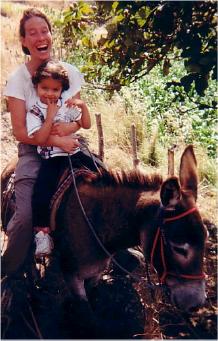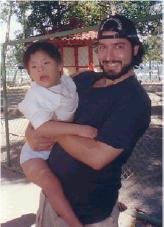 Living Nicaragua's dubious distinction
Living Nicaragua's dubious distinction
By Tom Fox, NCR publisher
Rachel Mahlik and Marvin Grilliot are married and have spent the last two years working in Managua, Nicaragua as Jesuit Volunteers. Mahlik worked in Managua with Proyecto Generando Vida (Project Generating Life). She taught 5th and 6th grade in an after-school program and wrote a religion curriculum. Grilliot worked as a social worker at Pajarito Azul Center, a home for 95 differently-abled people. In October, they will move to Tiraque, Bolivia to continue working as Jesuit Volunteers in a rural school.
Recently, the couple was home visiting in Kansas City, and I asked them about their experiences in Nicaragua.

|
| Rachel Mahlik |
Fox: Nicaragua recently surpassed Haiti as the poorest nation in the Western Hemisphere, according to the United Nations. What does this mean for the average Nicaraguan?
The Central Bank of Nicaragua states that currently 60 percent of the Nicaraguan population lives on less than $2 a day while the United Nations Development Program (UNDP) estimates that between 1990-2001, 82.3 percent of the population of 5 million lived on less than a dollar a day. In a country where unemployment is around 50 percent, prospects for living a life with dignity are bleak.
This dubious distinction of being the poorest nation in the Western hemisphere reflects the cumulative effects of 13 years of free market economics and slashes in social spending.
Some 50,000 Nicaraguans have turned to working in the free trade zone sweatshops run by foreign businesses. Free trade zones attract foreign business because they receive huge tax incentives. Coupled with the desperate economic situation of Nicaragua's labor force, these maquilas make huge profits for their owners. Most of these businesses are Asian-owned textile shops that export their clothes to the United States.
Envio, a monthly Nicaraguan news magazine, recently reported that a pair of pants that sells in the United States for $48 costs $3 to produce in Nicaragua. Maquila workers, predominantly women, earn about $60 a month in the free-trade zone.
Nicaragua is still crippled by a $6.6 billion external debt dating back from the U.S. government-supported Somoza dictatorship. The government spends as much on foreign debt repayment as on health care and education combined.
Many not-for-profit and grassroots organizations are building hope in creative and inspiring ways. Proyecto Generando Vida, directed by the Sisters of Sion in Managua, works in materially poor El Recreo barrio. The project is a community effort run by residents from the barrio and some international volunteers. People participate in 14 programs including youth and senior activities, educational classes, and programs for women. The resident volunteer community participates together in spiritual activities and Masses, applying their reflections to everyday life and larger societal realities. In a country where divisions often run deep, Generando Vida illustrates possibilities for broad-based discussion and problem solving.

|
| Marvin Grilliot |
Why should the average American care about what happens in Nicaragua?
Because the human family transcends borders and because as a country that considers itself "under God," the United States should care about the well-being of its neighbors. Nicaragua and the United States share a long history. Nicaragua is connected to the United States by land, divided only by human-contrived borders and the distance in people's minds between "us" and "them."
The United States' lifestyle is inextricably linked to Nicaragua's standard of living. As 6 percent of the world's population, the United States consumes 25 percent of the world's resources. A recent newspaper article in Nicaragua said that the United States uses the same amount of gasoline in 3 hours that Nicaragua uses in one year.
An average citizen in the United States votes by spending money. Buying a pair of jeans made in Nicaragua from a chain here in the United States is an endorsement of the economic policies that produce those jeans. Alternatives exist that promote fair trade and wages. Supporting local food and commerce is a simple, effective method that encourages right relationships.
Nicaragua has provided some excellent examples of dealing with national problems. During the 1980s, Nicaragua achieved free, compulsory education, universal health care, and a cooperative work system that put people's well-being ahead of money. The United States still continues to grapple with these issues.
What role has the Catholic Church played in Nicaragua?
There are two Catholic churches in Nicaragua. There is the church of Cardinal Miguel Obando y Bravo, who emphasizes the endurance of life's struggles and waiting until the next life. As archbishop of Managua since the 1970s, Obando y Bravo has been a major player in Nicaragua for the past 30 years. He enjoys wide popular support and the support of Rome. He was both heavily criticized or highly praised for not condemning the Contra War during the 1980s. Recently, he and some of his associates were investigated for involvement in the corruption of the Alemán government. (Arnoldo Alemán, the former president of Nicaragua, is imprisoned there on charges of embezzling $100 million before he left office in 2001.) The archbishop and his associates were accused of receiving several automobiles and abusing the church's tax-exempt status to have cars for friends.
The other church in Nicaragua is a more grassroots church illustrated by Generando Vida project. The vision of this church is for greater participation by the lay people, community discussion, and social action. A number of grassroots organizations and popular movements in Nicaragua are supported by Christian Base Communities. For example, Christian Base Communities have been active against the privatization of water and power and organized demonstrations against the U.S. Iraq War.
What are the lingering effects of the Contra War you mention? What U.S. and foreign policies are specifically affecting Nicaragua currently?
Despite the end of the Contra War 13 years ago, its memory still pervades and greatly affects Nicaragua. Nicaragua easily has the largest military in Central America. In the recent 2002 presidential election with former president Daniel Ortega leading the polls, the Liberal party camp under Enrique Bolaños guaranteed that a vote for Ortega would mean a return to war and hostilities with the United States. One day before the election, Florida Governor Jeb Bush took out a full-page ad in a Nicaraguan newspaper saying that the United States supported Bolaños.
Politics in Nicaragua still reels from the divisive Contra War in which an estimated 100,000 people died. Political discussion is stifled by acrimonious accusations and unyielding positions by both parties. Daniel Ortega maintains an iron grip on the opposition Sandinista party. Despite three unsuccessful bids for president, he decides his party's agenda. The Sandinistas still control 38 of the 92 seats in the National Assembly, with most voting along strict party lines.
Tom Fox can be reached at tfox@natcath.org
|
 Living Nicaragua's dubious distinction
Living Nicaragua's dubious distinction